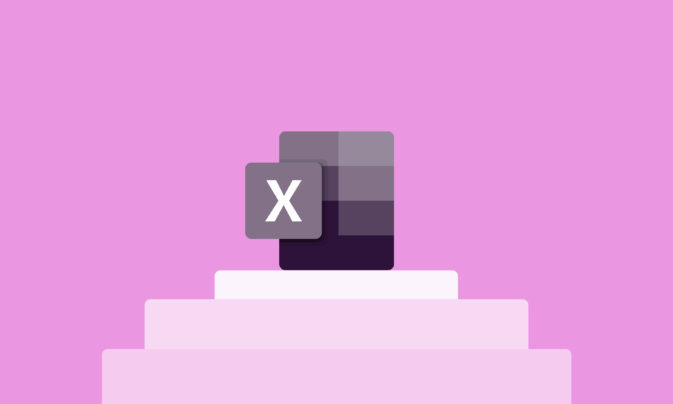38% of the workforce are full-time or part-time freelancers. As a company of one, managing your time efficiently and effectively allows you to deliver projects and get paid accurately.
Many freelancers turn to time tracking apps to optimize their work processes, improve productivity, and turbocharge their billing. Throw in project management integrations, handy mobile apps, and detailed financial reporting, and it’s easy to see how time tracking apps are revolutionizing the way freelancers work.
Never tried one before? You’ve come to the right place! Below, we have analyzed tracking tools for freelancers, comparing the 11 best options on the market so you can make an informed choice.
Best time tracking app for freelancers at a glance
| Tool | G2 | What is It? | Best For |
|---|---|---|---|
| Toggl Track | 4.6 | A well-designed, user-friendly tool for freelancers requiring immediate time tracking, project planning, and invoicing functionality | Free, user-friendly time tracking, timesheets, and invoicing to manage multiple client projects with ease |
| Clockify | 4.5 | Simple and clean time tracking for freelancers on a budget | Freelancers on a budget looking for lean and simple time tracking |
| Harvest | 4.3 | A solid all-rounder for finance-conscious freelancers needing to track billable hours | An easy tool for tracking billable hours, managing hourly rates, and creating invoices |
| Hubstaff | 4.4 | Great for freelancers with a larger budget who need to track time seamlessly across multiple device | Freelancers looking for a well-connected time tracking app (and have a little more money to spend) |
| TimeCamp | 4.7 | Detailed productivity and profitability analysis for freelancers who need to optimize their time | Freelancers requiring deep productivity and profit boosts |
| Timely | 4.8 | AI-based tracking for freelancers who want to track their work in the background | AI-based monitoring for freeing up time to focus on client work |
| RescueTime | 4.1 | Great for freelancers focused on time management and productivity but don’t need invoicing | Freelancers needing help improving their productivity and time management |
| MyHours | 4.6 | Spreadsheet-style tracking for freelancers working across multiple projects | Spreadsheet-style time tracking for freelancers requiring simplicity and ease of use |
| TrackingTime | 4.5 | Slick time tracking with a dedicated single-user freelancer package | Time tracking across multiple devices |
| Memtime | 4.7 | Automatic time tracking in the background for Windows, Mac, or Linux users | Automatic background time tracking for those who don’t want to start/stop timers |
| EverHour | 4.7 | Strong time tracking for project-based freelancers with integrations into well-known project management tools | Project-based focused time tracking |
What to look for in freelance time tracking tools
At Toggl Track, we’ve spent years tailoring time tracking tools to support freelancers, contractors, and service-based businesses. We know time tracking is all about simplicity, cost, and ease of use for freelancers, turbocharging their earning power without investing thousands of dollars or wasting resources.
So, here are a few key features to look out for in the perfect freelancer time tracking tool:
- User-friendly: Time tracking tools must be intuitive and easy to use. Look for tools with automatic time tracking functionality and compatibility with web apps, iOS, and Android devices.
- Flexibility. Freelancers spend their lives moving from one client to the next, so make sure your tool can accompany them. It’s important to be able to manage different clients and projects through customized key workflows.
- Feature-packed: Freelancers aren’t blessed with giant budgets. So, look for a tool with time tracking features and functionality in other areas, like task management.
- Integrations: No time tracking tool does everything, so check it syncs up with other tools, especially project management software, calendars, and email.
- Invoicing features: Time management and billing clients go hand-in-hand. Prioritize software with built-in invoice templates and real-time reporting to speed up your billing cycle.
- Set billable rates: To simplify your invoicing workflows, hunt for a tool that handles different billable rates, billable hours, and non-billable hours. No two clients, projects, or days are the same, so having flexibility enables you to manage your finances and get cash into your bank.
- Detailed reports: When working across different clients, you need insights into your time usage, project time, and profitability. A tool capable of producing attractive reports, including those via Excel spreadsheets and PDF, will be a hit here.
- Pricing: For freelancers, budget is often the biggest driver when selecting the right tool. Apps with free plans or low monthly costs achieve good value for money and allow you to stay within your budget.
A deeper look at the best time tracker tool for freelancers
Because you’re a busy freelancer with a lot on your plate (to accomplish solo, nonetheless), let’s get straight into the top time tracking tools for freelancers.
To curate this list, we analyzed customer reviews and tested different functionalities, focusing on tools that offer a great user experience and the features freelancers need to deliver outstanding client results.
Toggl Track
📌 Toggl Track blends user-friendly time tracking, timesheets, and invoicing to manage multiple client projects with ease.
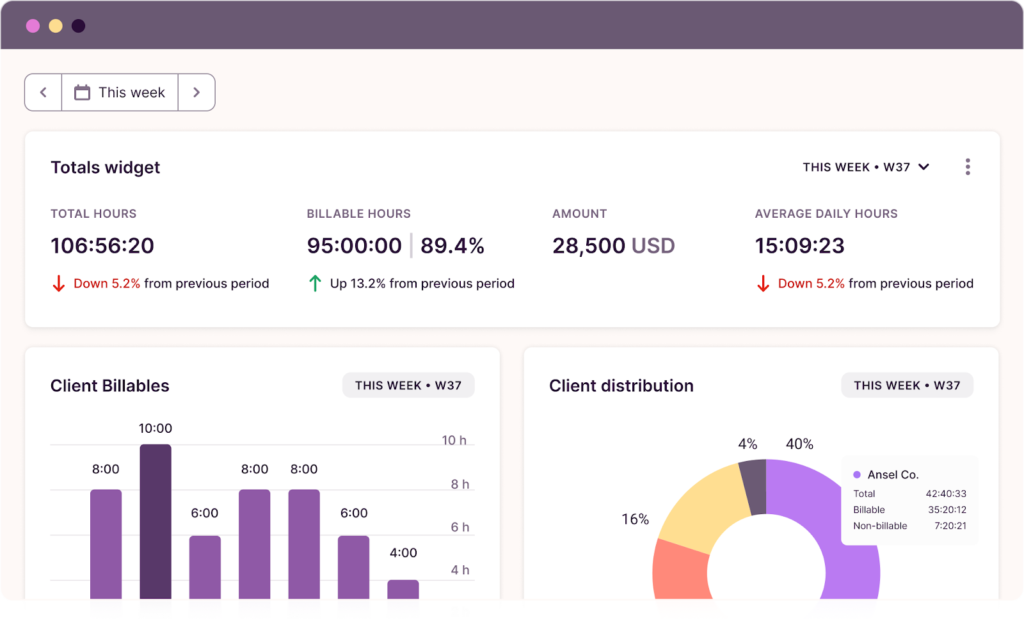
Toggl Track prides itself on being super easy to use, highly accurate, and automated. Our platform enables freelancers to manage multiple client projects end-to-end with ease. Native time tracking through Chrome and mobile apps helps you quickly start and stop timers, with those tracked work hours automatically converting to professional client-ready invoices when you’re ready to get paid.
| ✅ Pros | ❓Cons |
|---|---|
| • Clean and simple time tracking with integrations into other project and work management systems • Shareable timelines providing project progress updates for clients • Fast and humane customer support, maximizing the value you receive from Toggl Track | • Limited functionality on the app versus the full web version • The free plan has a five-user limit |
Pricing and plans
- Free: Up to five users with unlimited tracking across all platforms. Includes Google and Outlook integrations, and six months of data storage.
- Starter: From $9 per user/mo for project management tools, extra project templates, and no data storage limits.
- Premium: Get extra integrations, SSO, and API customization for $18 per user/mo.
- Enterprise: Clients can manage multiple workspaces, while a dedicated Customer Success Manager provides priority support. Ask the Toggl Track team for customized pricing.
🧠 G2: 4.6 (1,570), Capterra: 4.7 (2,362)
Clockify
📌 Clean and simple time tracking, great for freelancers on a budget.

For freelancers requiring no-nonsense time tracking, Clockify’s core focus is on accurate timesheets, automatic tracking, and detailed analytics. Clockify has a desktop, browser, and mobile app and includes decent invoicing functionality to get you paid fast and effectively.
| ✅ Pros | ❓Cons |
|---|---|
| • Multiple clean and simple time tracking options (such as Pomodoro) that are easy to use • Link time entries to different projects and raise invoices with ease • The free plan is generous for freelancers or small teams looking to get started with time tracking | • Free and basic plans lack invoicing functionality • Users report Clockify’s support can be patchy, making it difficult to resolve issues |
Pricing and plans
- Free: Unlimited projects and unlimited users, access to the iOS and Android app, and automated time tracking
- Basic: From $3.99 per user/mo. Adds security features, templates, and enhanced exporting
- Standard: From $5.49 per user/mo. Includes invoicing and QuickBooks integration
- Pro: From $7.99 per user/mo, you can add in forecasting and multi-currency
- Enterprise: From $11.99 per user/mo. Adds extra customizations such as SSO and audit logs
🧠 G2: 4.5 (170), Capterra: 4.7 (4,905)
Harvest
📌 A solid all-rounder for tracking billable hours, managing hourly rates, and creating invoices.

Harvest could be the right option for freelancers looking to manage their billable hours and expenses. It’s a well-connected system with automated tracking, productivity reports, and system-system integrations, helping freelancers combine and simplify their day-to-day workflows.
| ✅ Pros | ❓Cons |
|---|---|
| • Integrates well with payment tools such as PayPal and Stripe and project management tools such as Asana • Allows you to set hourly or fixed fee budgets for each project and get instant alerts when you reach your threshold • Its simple pricing structure makes it easy to unlock more premium features | • Limited ability to customize the system makes it difficult to automate workflows • Limited reporting features make it hard to get detailed time reports and business-critical insights |
Pricing and plans
- Free plan: Provides all Harvest’s features for one user, working on two projects
- Harvest Pro: $10.80 per seat/mo gives you everything Harvest has to offer
🧠 G2: 4.3 (806), Capterra: 4.6 (595)
Hubstaff
📌 A well-connected time tracking app useful for slightly larger budgets.

Hubstaff’s well-connected platform allows freelancers to track their time wherever they are. Its integrated invoicing, timesheeting, and reporting functionalities make turning tracked hours into cash in the bank easy. The platform is compatible with Mac, Windows, Linux, and Chrome.
| ✅ Pros | ❓Cons |
|---|---|
| • Great connectivity across different device types, including a desktop app • Automated workflows make it easy to simplify tasks and basic project work • 35+ native integrations, including Trello, Microsoft Outlook, and Slack | • For small freelancer teams, features such as screenshot monitoring feel like surveillance and can erode trust • The user interface is a little dated, making it harder to onboard and work with day-to-day |
Pricing and plans
- Starter: Basic tracking and timesheets start at $4.99 per user/mo
- Grow: From $7.50 per user/mo, get one integration, expenses, and idle timeouts
- Team: From $10 per user/mo, you can start tracking time on tasks alongside unlimited tracking and integrations
- Enterprise: Suitable for larger businesses (advanced features such as location tracking, SSO, and compliance tools start from $25 per user/mo)
🧠 G2: 4.4 (1,040), Capterra: 4.6 (1,489)
TimeCamp
📌 Great for freelancers requiring deep productivity and profit boosts.

TimeCamp supports freelancers in billing every minute of their workday so they can transform any freelancing gig into a steady, income-generating business. Calendar integrations, one-click timers, and customizations send freelancers deep into their productivity, identifying ways to streamline their processes while delivering work their clients love.
| ✅ Pros | ❓Cons |
|---|---|
| • Detailed insights into productivity and process improvement opportunities • Integrations with lots of other well-known tools, including Asana, Jira, and monday.com • Strong billing and invoicing capabilities to get freelancers paid | • Users report a weak offering on mobile apps that reduces flexibility • Limited reporting features make it difficult to get detailed time tracking insights without exporting data to CSV |
Pricing and plans
- Free plan: No time limit on users or projects, but only includes very basic tracking
- Starter: From $2.99 per user/mo for invoicing and unlimited tasks
- Premium: From $4.99 per user/mo, customize billable hours and integrations
- Ultimate: From $7.99 per user/mo, add customizable rates per project/client
- Enterprise: Become a VIP with priority support and custom integrations for $11.99 per user/mo
🧠 G2: 4.7 (318), Capterra: 4.7 (598)
Timely
📌 AI-based monitoring frees up time for freelancers to spend on client work.
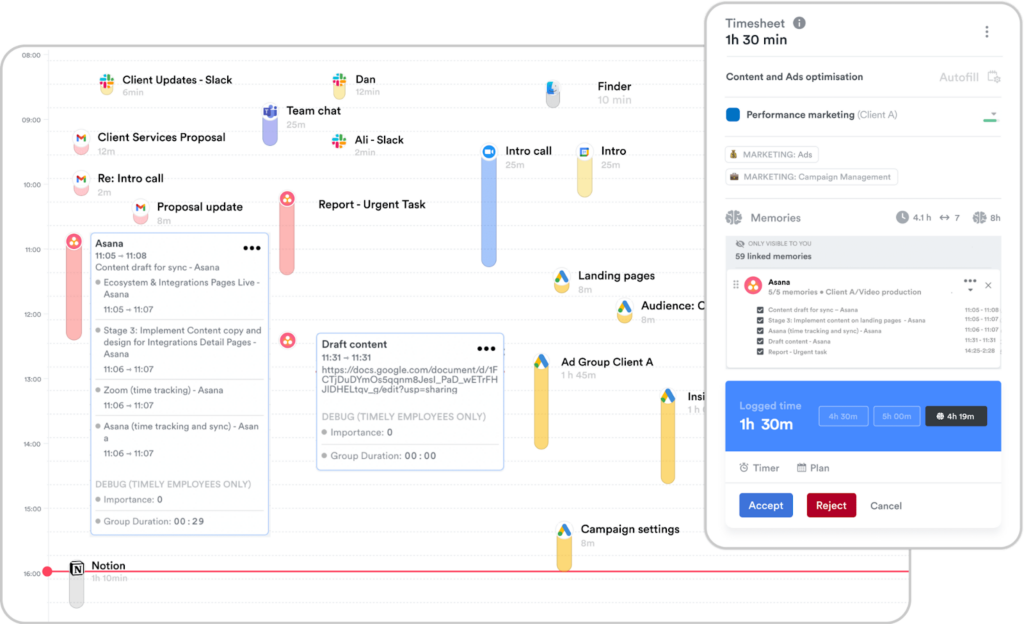
Timely’s AI-based time tracking removes any manual intervention, tracking each of your activities automatically and saving them as ‘memories’ to review later. This allows freelancers to optimize their day, reducing admin while creating detailed insights into the tasks that take more or less of your time.
| ✅ Pros | ❓Cons |
|---|---|
| • Automatic, AI-based time tracking on a desktop device without starting or stopping timers • Detailed insight and analytics to influence rates, manage productivity, and create professional invoices • A fresh and sleek user interface | • High price compared to competitors, especially for smaller freelance budgets • While some integrations work well, users report challenges, bugs, and the need for workarounds |
Pricing and plans
- Starter: From $9 per user/mo for time tracking, AI assistance, and in-app support
- Premium: From $16 per user/mo for broader team management, budgeting, and costs
- Unlimited: From $22 per user/mo for all the Premium features, with additional time types, currencies, and integrations
🧠 G2: 4.8 (419), Capterra: 4.7 (215)
RescueTime
📌 Rescues freelance time by boosting productivity and time management.

As the name suggests, RescueTime is all about helping freelancers find more time. Unlike competitors that focus on invoicing and billing, RescueTime boosts productivity by tracking screen time, setting ‘focus time’ goals, and providing detailed productivity insights.
| ✅ Pros | ❓Cons |
|---|---|
| • Strong focus on productivity, with detailed insights into time management habits • Automatic time tracking for app-based work • Offline mode for tracking if you’ve not got WiFi | • No invoice or billing features mean you’ll need other tools to turn hours into cash • The user interface is a little dated compared to competitors |
Pricing and plans
- Individual users: Can get additional features such as insight reports from $6.50 per user/mo
- Teams: For $9 per user/mo, you get real-time projects, time sheeting, and integrations (minimum 2 users)
🧠 G2: 4.1(90), Capterra: 4.6 (139)
My Hours
📌 Spreadsheet-style time tracking for freelancers requiring simplicity and ease of use.

My Hours’s spreadsheet-style user interface makes it easy for freelancers to track their time across multiple projects before turning hours worked into professional invoices. You can create reports and filter by project, client, or task level.
| ✅ Pros | ❓Cons |
|---|---|
| • Spreadsheet style user interface is easy to learn and simple to use • Detailed reporting by client or project makes it easy to track performance and profitability • Generous free plan with unlimited projects and clients for up to five users | • Invoicing functionality is basic compared to competitors • The user interface and reports aren’t very well-designed and appear outdated |
Pricing and plans
- Free: Unlimited clients, unlimited projects, and basic time tracking
- Pro: Priority customer support, invoicing, and detailed reporting come for $8 per user/mo
🧠 G2: 4.6 (263) Capterra: 4.8 (990)
TrackingTime
📌 Slick time tracking across multiple devices with a dedicated single-user freelancer plan.

TimeTracking’s all-in-one solution helps freelancers track their time, manage their projects, and complete time cards from one place. While focused on small teams, there are loads of features here for freelancers, including productivity hacks such as time blocking, auto time tracking, and real-time app sync.
| ✅ Pros | ❓Cons |
|---|---|
| • Flexible browser, desktop, and mobile app tracking keeps you synced on any device • The AutoTrack feature captures hours worked in the background, reducing manual effort • Integrations with 50+ well-known tools, including Google, Airtable, and Ring Central | • Users report occasional crashes in the platform and integrations • Limited invoicing features compared to competitors |
Pricing and plans
- Free: AutoTrack and Unlimited tasks, projects, and clients for up to three users
- Freelancer: $8 per user/mo requiring project management and basic integrations (one user max)
- Pro: $5.75 per user/mo for all the features you need (three users minimum)
- Business: Gives you the Pro experience plus SSO, priority support, and onboarding for $10 per user/mo
🧠 G2: 4.5 (86) Capterra: 4.6 (40)
Memtime
📌 Automatic background time tracking for those who don’t want to start/stop timers.
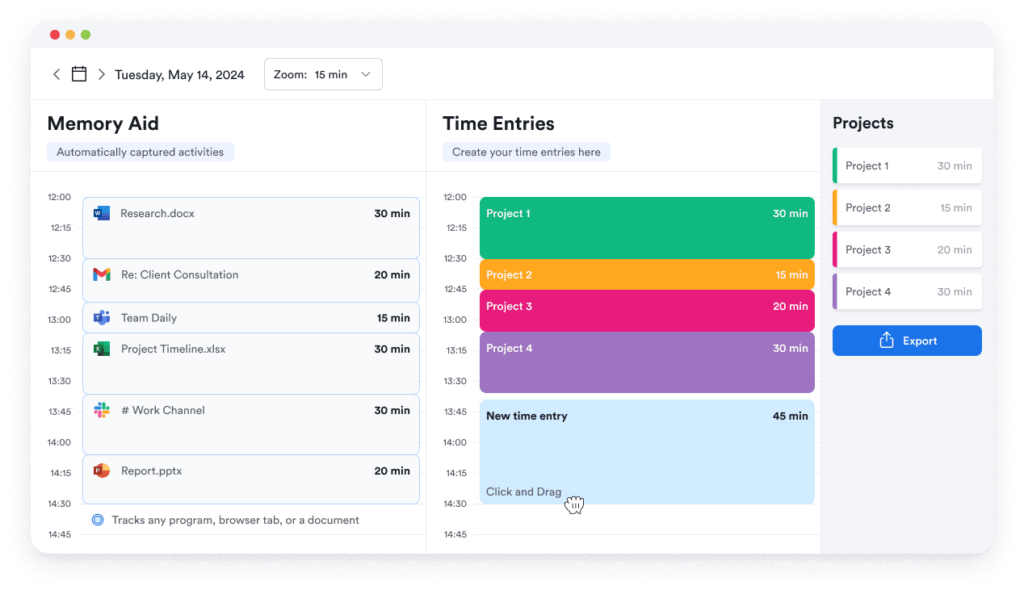
Memtime’s mission is to help freelancers work less and get paid more with their automatic, in-app time tracking. With the desktop app installed, Memtime runs in the background to track your work, storing by application, project, or client to produce accurate bills for every freelance task or project.
| ✅ Pros | ❓Cons |
|---|---|
| • Automatic time tracking saves time for Windows, Mac, and Linux users • Integrations with numerous platforms, including Toggl Track • For small teams of freelancers, Memtime has a strong approach to privacy and anti-data sharing | • No invoicing features • User reports the user interface is hard to navigate |
Pricing and plans
- Basic: From $10 per user/mo, you get Memtime’s automatic time tracking and reporting
- Connect: Add in integrations and project management sync for $15 per user/mo
- Premium: For $20 per user/mo, you get priority support and SSO login
🧠 G2: 4.7 (158) Capterra: 4.6 (119)
Everhour
📌 Time tracking with a strong bias towards project-based working.
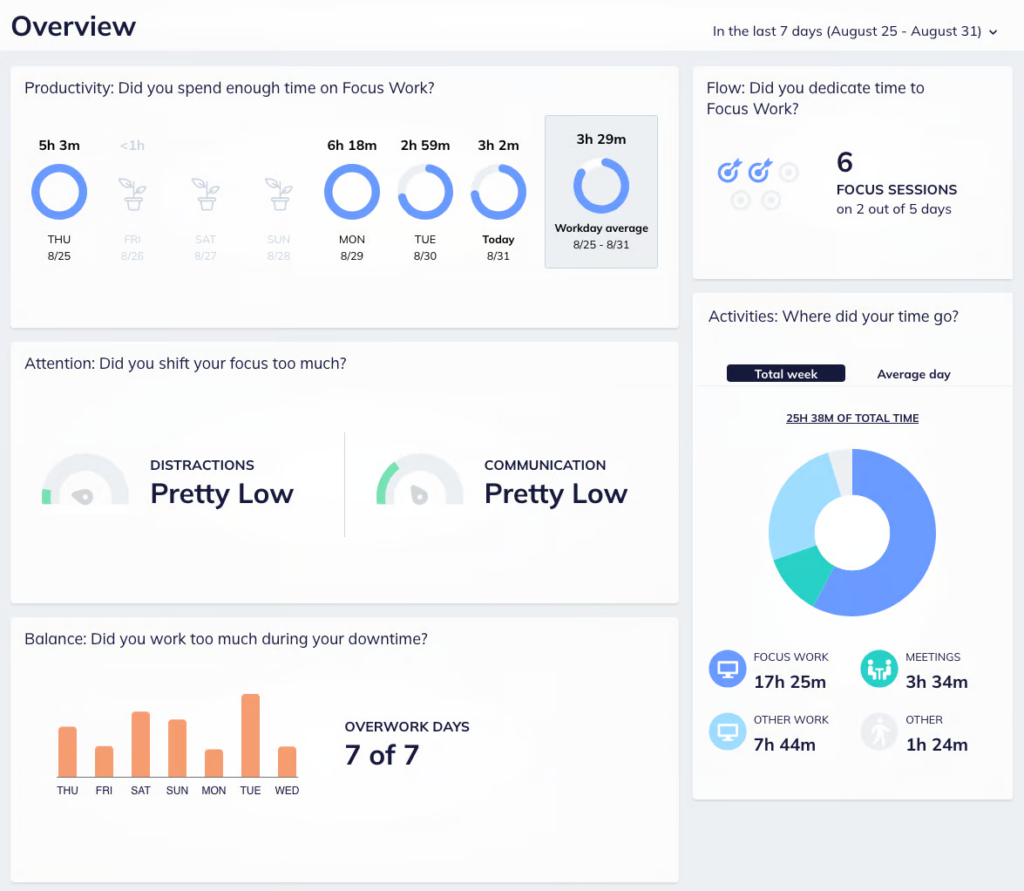
If you’re looking for a time tracker and project management hybrid, Everhour could be a solid option. With simple start/stop tracking across web and mobile devices, it’s easy to track time against your client projects, with notifications when you’re approaching a project’s budget and detailed reporting on expenses and costs throughout.
| ✅ Pros | ❓Cons |
|---|---|
| • Simple time tracking across browsers and mobile devices • Lots of project management integrations, including Asana, ClickUp, Jira, and monday.com • Detailed reporting on project budgets, costs, and expenses keeps you on track | • The pricing structure may put off individual freelancers or small teams of four or fewer • Limited customization can make it hard for teams to onboard |
Pricing and plans
- Free: Up to five seats with basic time tracking, projects, and tasks
- Team: For $8.50 per user/mo, you get additional integrations, budgeting, and expense management features (minimum five seats required)
🧠 G2: 4.7 (174) Capterra: 4.7 (425)
How to choose the best time tracking software
Now you’ve reviewed each software, it’s time to decide. What’s right for one freelancer isn’t always right for another, so use these steps to evaluate your needs and decide on the best-fit tool.
- Understand your requirements: Make sure you’re clear on exactly what you need from a time tracking tool. While timesheets are the basics, consider other features, such as integrations and workflows, to optimize your work time.
- Trial different tools: Many of the tools we’ve covered have a free plan or offer a limited free trial. Don’t be afraid to try out various apps to ensure they align with your working style.
- Consider mobility: For many busy freelancers, being able to work on the go is important. Ensure your tool works across all your devices so you can clock in no matter where you are.
- Seek customization: Look for a tool that can adapt to your specific time management needs, such as workflows, custom billing rates, or integrations.
- Read freelancer reviews: Lastly, time tracking tools are used by businesses of any size. And what works for a large enterprise probably won’t be best for a solo business. Check out user reviews to ensure your chosen platform is valuable for freelancers like you.
Try time tracking software for free
We’ve worked with a lot of freelancers in our time, so we know time tracking can really make a difference to how you manage and bill clients. While every tool on our list offers something great for freelancers, we think Toggl Track is the best offering on the market.
Toggl Track’s billable and non-billable time tracking (automatic, start/stop timer, and manual), invoicing, and simple project/task management features are essential for freelancers looking to improve their client management. With a clean user interface, Chrome extension, and mobile app, it’s easy to incorporate Toggl Track into your daily routine without a steep learning curve.
But don’t just take our word for it, create a free account and give Toggl Track a try for yourself today!
James Elliott is an APMQ and MSP-certified project professional and writer from London. James has 8 years' experience leading projects and programs for tech, travel, digital, and financial services organizations, managing budgets in excess of £5m and teams of 30+. James writes on various business and project management topics, with a focus on content that empowers readers to learn, take action, and improve their ways of working. You can check out James’ work on his website or by connecting on LinkedIn.



